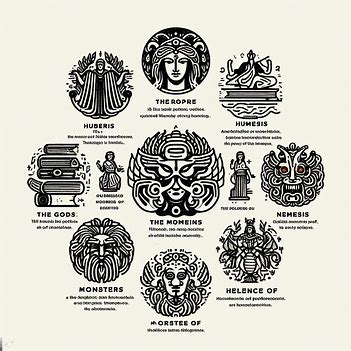Greek mythology stands as a timeless treasure trove of ancient tales, weaving together gods, heroes, and fantastical creatures. For students and enthusiasts alike, delving into the rich tapestry of Greek mythology offers an opportunity to explore not only the narratives themselves but also the cultural, historical, and philosophical aspects of ancient Greece. In this blog, we will unravel a diverse array of Greek mythology essay topics that promise to ignite the imagination and provide a deeper understanding of this fascinating realm.
1. The Role of Greek Myths in Shaping Ancient Greek Society:
- Explore how Greek myths served as a cultural compass, influencing social norms, religious practices, and moral values in ancient Greek society.
- Analyze the connections between mythological stories and rituals, ceremonies, and festivals, shedding light on the profound impact of these narratives on daily life.
2. Symbolism in Greek Mythology:
- Examine the symbolic meanings behind key elements in Greek myths, such as the gods, monsters, and legendary artifacts.
- Discuss how symbolism in Greek mythology extends beyond the narratives to encompass broader themes like fate, justice, and the human condition.
3. Comparative Analysis of Greek and Roman Mythology:
- Contrast the Greek and Roman versions of similar myths, such as the stories of Zeus and Jupiter, and explore how cultural nuances influenced their interpretations.
- Investigate the reasons behind the appropriation and adaptation of Greek myths into Roman mythology and its implications for both societies.
4. The Hero’s Journey in Greek Mythology:
- Trace the archetypal hero’s journey in Greek myths, from the call to adventure to the hero’s return, using examples like the adventures of Odysseus or Heracles.
- Discuss how the hero’s journey reflects universal themes and resonates with audiences across different cultures and time periods.
5. Feminine Archetypes in Greek Mythology:
- Explore the portrayal of female figures in Greek myths, from goddesses to mortal heroines, and analyze the archetypal roles they embody.
- Discuss the societal implications of these archetypes and how they contributed to the perception of women in ancient Greece.
6. Morality and Ethics in Greek Mythology:
- Examine the ethical dilemmas faced by characters in Greek myths and explore the moral lessons imparted through these narratives.
- Discuss the concept of hubris and its consequences in various myths, emphasizing its role in shaping the moral fabric of ancient Greek society.
7. The Influence of Greek Mythology on Western Literature:
- Trace the echoes of Greek myths in works of literature, poetry, and drama throughout Western history, from ancient Greece to the present day.
- Analyze how themes, characters, and motifs from Greek mythology continue to inspire and inform contemporary storytelling.
8. The Concept of Fate and Free Will in Greek Mythology:
- Investigate how the tension between fate and free will is depicted in Greek myths, with a focus on characters who grapple with their destinies.
- Discuss the philosophical implications of these themes and their relevance to broader discussions about determinism and agency.
9. Monsters and Monstrosity in Greek Mythology:
- Explore the symbolism of monsters in Greek myths and their role in representing societal fears, challenges, or the unknown.
- Analyze how heroes’ encounters with monsters serve as metaphorical journeys into the depths of the human psyche.
10. Greek Mythology in Modern Popular Culture:
- Examine the pervasive influence of Greek mythology in contemporary literature, film, television, and video games.
- Discuss the ways in which modern creators reinterpret and adapt ancient myths to resonate with contemporary audiences.
11. The Relationship Between Gods and Mortals in Greek Mythology:
- Explore the complex interactions between gods and mortals in Greek myths, focusing on themes of divine intervention, punishment, and favoritism.
- Discuss how these relationships mirror power dynamics within ancient Greek society.
12. The Underworld in Greek Mythology:
- Delve into the concept of the Underworld in Greek mythology, examining the realms of Hades and the journeys of mortals into the afterlife.
- Analyze the symbolism of the Underworld as a place of judgment, punishment, and, in some cases, redemption.
13. Greek Mythology and Astronomy:
- Investigate the connections between Greek mythology and ancient Greek astronomy, exploring how constellations and celestial phenomena were often linked to mythological narratives.
- Discuss the cultural significance of celestial myths and their impact on early scientific thought.
14. Tragedy and Catharsis in Greek Mythology:
- Explore the tragic elements of Greek myths and their role in providing audiences with a cathartic release of emotions.
- Analyze famous tragedies, such as the myths of Oedipus or Medea, and their enduring impact on the understanding of tragedy in literature and drama.
15. Mythological Influences on Greek Art and Architecture:
- Examine how Greek myths inspired artistic expressions, from sculptures and pottery to temple design and city planning.
- Discuss the symbolism embedded in artistic depictions of mythological themes and their role in communicating cultural values.
Greek mythology serves as an enduring source of inspiration, offering a glimpse into the collective imagination of ancient Greek civilization. By exploring these essay topics, students and researchers can unravel the layers of meaning within these myths, gaining insights into the cultural, philosophical, and historical dimensions of ancient Greece. Whether delving into the psychological depths of heroes, deciphering the symbolism of monsters, or examining the influence of Greek mythology on modern culture, the exploration of these topics promises a journey into the heart of one of humanity’s oldest storytelling traditions. As we navigate the tapestry of Greek mythology, may these essay topics spark curiosity and illuminate the timeless tales that continue to captivate minds and hearts across the ages.
